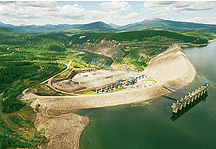British Columbia is providing the gas industry with 78 million cubic meters of free water each year, according to a recent CBC article. That water, the equivalent to 31,000 Olympic-sized swimming pools, is used to hydraulically fracture, or frack, the Northeast portion of the province which is undergirded by a vast reservoir of unconventional gas.
The B.C. government has recently added another 3.65 million cubic meters of water per year to that total by issuing an additional permit to Talisman Energy. The permit grants Talisman permission to withdrawal water from the Williston Reservoir, B.C.’s largest freshwater body, for 20 years.
Historically, the B.C. Oil and Gas Commission (BCOGC) has granted short-term, temporary water withdrawal permits to the oil and gas industry, a process critics argued circumvented the environmental evaluation necessary for long-term permits. In this instance, Talisman has received one of the largest water withdrawal permits of its kind.
Ben Parfitt, analyst with the Canadian Centre for Policy Alternatives, who has written extensively on the water/energy nexus in B.C., says this scope of behind-the-scenes permitting is unprecedented. According to Parfitt, the B.C. government is avoiding the public consultation process. “I’m not aware of any…[robust] consultation taking place. I don’t think the public has any idea,” he told the CBC.
According to CBC, a statement released by Steve Thomson, Minister of Forest, Lands, and Natural Resource Operations, said Talisman’s application was approved without public consultation because the water withdrawal amount fell below the environmental assessment threshold of 10 million cubic meters. The license did, however, undergo a technical assessment of water availability.
Unconventional gas extraction in the province’s far reaches has been happening at an accelerating pace, despite calls for an investigation into the process. Independent MLA Bob Simpson, who recently called upon Premier Christy Clark to launch a full scale review of the economic, environmental and health implications of drilling in the region, says Talisman’s water withdrawal permits are unsustainable.
“We should not be giving away the public water resource,” he told the CBC. “To use fresh water for hydraulic fracturing – pour toxins into that water…put it into permanent storage – taking it out of the water cycle. How’s that sustainable?”
The B.C. government failed to consult the public despite explicit promises to do so, Simpson’s office said in a press release. The promise came at the end of the last legislative session, when Energy and Mines Minister Rich Coleman publicly stated that “extensive public consultation and discussion” would take place before these types of water withdrawals were approved.
“This water is a public resource that has economic, social and ecological values beyond using it for the controversial ‘fracking’ process,” Simpson said, adding, “the government had an obligation to fulfill the Minister’s promise to conduct ‘extensive’ consultation before allowing this significant amount of water to be mixed with unknown toxins and then permanently removed from the Earth’s water cycle.”
The gas industry’s water projections are growing and Talisman is just one of several companies eager to channel B.C.’s water for their fracking operations. A second permit for Canbriam Energy is up for issue at the end of this week.
Subscribe to our newsletter
Stay up to date with DeSmog news and alerts






